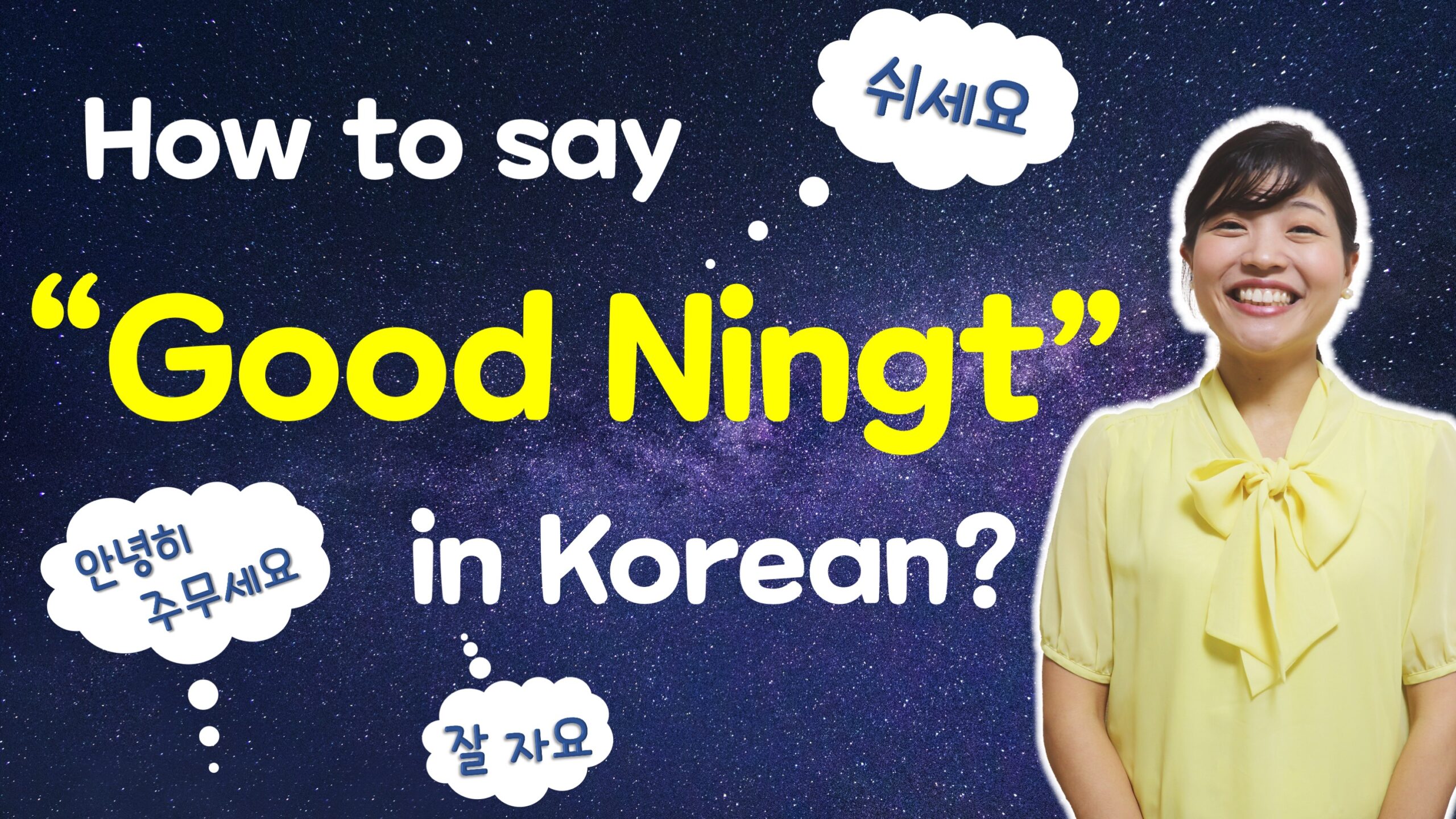Today, let’s take a look at how to say “good night” in Korean, a greeting we use every day.
There are many different ways to say “good night” in Korean, depending on the person you are saying to and the situation.
Here, I will introduce eight different ways to say “good night” such as 안녕히 주무세요, 안녕히 주무십시오, 잘 자요, 잘 자, 쉬세요, 푹 쉬어요, 쉬어, and 내 꿈 꿔.
그럼 시작할게요!
안녕히 주무세요
This is the common expression for “good night” in Korean and you can find it in your textbook.
You can use this to elder people such as your parents or your grandparents.
Did you notice that many Korean greetings include the word “안녕” in them, such as 안녕하세요? Hello, 안녕히 가세요 Good bye , and 안녕히 주무세요, good night.
This 안녕 is a Chinese character, which means “peace, good health.”
주무세요 is a respectful word meaning “please sleep well”.
In other words, 안녕히 주무세요 directly translates to “Please have a peaceful night.”
안녕히 주무십시오
Second, I will teach you 안녕히 주무십시오. It is a more formal version of 안녕히 주무세요 that we have just learned.
In everyday conversation, you can use 안녕히 주무세요 to elders.
But if you want to make it extra polite, you can say 안녕히 주무십시오.
Likewise, (으)세요 in 주무세요 gives a softer impression, while (으)십시오 in 주무십시오, gives a more formal and stiff impression.
잘 자요
This is the most commonly used “good night” greeting among close family and friends.
When you break down this phrase, 잘 means “well” and 자요 means “sleep.”
So, the literal translation of “잘 자요” is “sleep well.”
As an application of this, if you wake up in the morning, you can say “Good morning.” right ?
In Korean, it is going to be “잘 잤어요?”
As you already know, 잘 means “well,” and 잤어요? means “Did you sleep?”
So, direct translation would be “Did you sleep well?”
If you have a close relationship with someone who uses 잘 자요, you can also use 잘 잤어요 as a “good morning.”
잘 자
This is a more informal and casual version of 잘 자요 and you can use it to friends or siblings.
In the case of 잘 자요, this 자요 part is in the 요 form, which makes the language polite.
But in 잘 자, this 자 part is called 반말, casual speech.
That’s why you use it with your friends or siblings.
쉬세요
Same as 안녕히 주무세요 and 잘 자요, Korean people also use 쉬세요 as “good night.”
In this phrase, 쉬다 means “to rest.” And a respectful expression (으)세요 is attached to 쉬다, which makes 쉬세요.
It means “please take a rest.” You can use this whenever you want to recommend some to take a rest.
So this expression is appropriate not only in the situation of going to bed, but also in a situation where someone finished a hard exercise.
쉬세요 is short, but this is also polite way to say “take a rest.”
So, you can say it to your elders.
Since Korean people use 쉬세요 very often in their life, it would be useful to memorize this expression.
푹 쉬어요
Like 쉬세요 we have just learned, this expression also uses 쉬다 “to rest.”
푹 means “soundly /completely,” and 쉬어요 means
take a rest.” Here, you should pay attention to the pronunciation. It is not 쉬어요, but more like 셔요.
So, together it means “take your rest soundly.” In other words, “Have a good night’s sleep.”
푹 쉬어요 is also polite expression, but compared to 쉬세요, it is more casual.
So you can use it to your family, friends, and other close people.
쉬어
This expression is even more casual than 푹 쉬어요, and this is 반말, casual speech. It is also pronounced 셔, not 쉬어.
As with 잘 자 “good night,” you can use it to your close friends or siblings.
If you are using 잘 자 to your friend, try using 쉬어 to expand your expression.
내 꿈 꿔
This “내 꿈 꿔” is a little bit different from the conventional “good night.”
And it is a little bit cheesy and romantic expression.This phrase was very popular in 1990.
If you use it to your korean friends, they will be surprised that you know this phrase.
Let’s break down the meaning of 내 꿈 꿔. 내 means “my,” 꿈 is “dream,” and 꿔 means “have (a dream.)”
So, it means “Have my dream.” In other words, it means “Have a dream about me.”
You can use it to your girlfriend or boyfriend at the end of a phone call or email.
Okay, you have learned eight different types of “good night.”
What did you think? Let’s use different ways to say “good night” depending on the person or situation.
I’m sure you will have fun studying Korean.
그럼 오늘도 행복 가득, 웃음 가득한 하루 되세요! 한국어 화이팅, 화이팅, 화이팅!!



